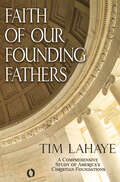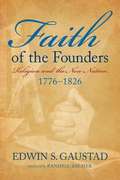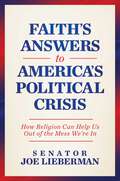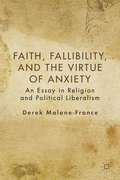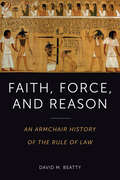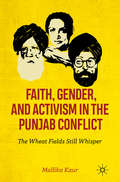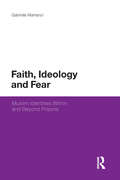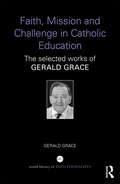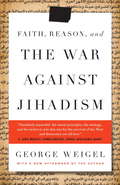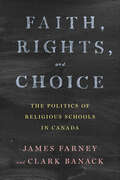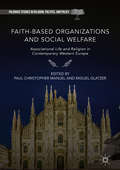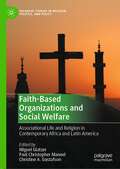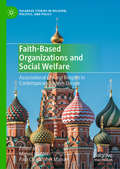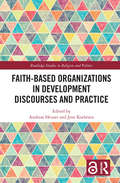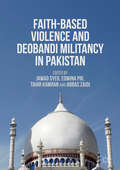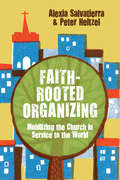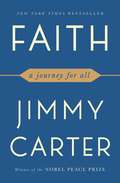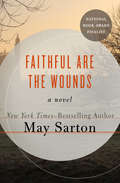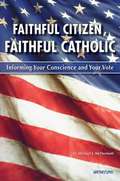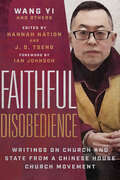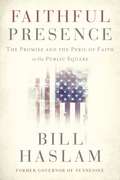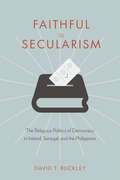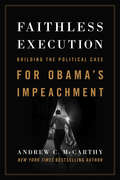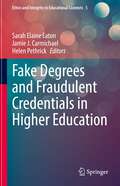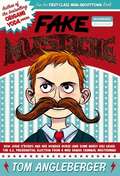- Table View
- List View
Faith of Our Founding Fathers: A Comprehensive Study of America's Christian Foundations
by Tim LahayeSecular textbooks now fill our classrooms, while the Ten Commandments have been removed from their walls. Is this the vision held by those who worked to found this nation? What faith did our founding fathers truly believe and practice in their daily lives, and what does it really matter for us? Were they God-fearing, Bible-believing Christians or simply enlightened Deists, Transcendentalists, and Unitarians? Today the debate rages on, becoming a polarizing cultural issue, the outcome of which will lead to a vastly different nation in the years ahead. This probing study: Examines the facts that have created debate for years among educators, scholars, and historians Studies the intimate papers, diaries, and letters of the founders themselves Helps solve this mystery of our nation's past so that we can best guide its future. Meticulously documented, Faith of Our Founding Fathers by best-selling author Tim LaHaye details the Christian principles of these early Americans, and notes how the argument for the separation of church and state has led us to the vast secularization of our culture. Studying the original writings of those who shaped this nation will help Christians present the case for renewing the former vision for this great country.
Faith of the Founders: Religion and the New Nation, 1776-1826
by Edwin S. GaustadIn the lauded Faith of the Founders , revered historian Edwin Gaustad provides a careful consideration of the developing relationship between religion and the state after the American Revolution. With concise focus on Thomas Jefferson, James Madison, Benjamin Franklin, George Washington, and John Adams, Gaustad identifies seven varyingâsometimes contraryâperspectives on religion that guided the nation's founders. Faith of the Founders masterfully shows how these figures possessed an intuitive understanding of religion that helped nourish a young country. Repackaged for a new generation of readers and with a new foreword by Randall Balmer, this brief but insightful book offers a look into the founding fathers' geniusâand points to a way forward through the ideological boundaries that threaten to upend the daily doings of American government today.
Faith's Answers to America's Political Crisis: How Religion Can Help Us Out of the Mess We're In
by Joe LiebermanCan the faith in God that most Americans share help us out of the political mess we&’re in?As both a religiously observant person and a veteran of forty years in elective office, Senator Joe Lieberman is uniquely prepared to answer this question. In fact, he is the first person with political experience to pose and answer such a question in response to the current crisis of political division and governmental dysfunction in America. Lieberman breaks down the causes of our political problems—including partisanship, incivility, and refusal to compromise—and then describes what the monotheistic faith that Christians, Jews, and Muslims share calls on us to do to overcome those problems. He directs this appeal to members of Congress and the White House; leaders of the news and entertainment industry, who have such a large influence on our values and political behavior; and members of the clergy, who need to be leaders of a new Religious Awakening in America. This book will provide a totally different way to look at American politics and government. It will open your mind and heart and give you hope for a better, more united future for our country.
Faith, Fallibility, and the Virtue of Anxiety
by Derek Malone-FranceMalone-France brings together important themes from religious studies, philosophy, and political theory to articulate a fundamental re-conception of religious faith and an innovative argument for classic liberal norms.
Faith, Force, and Reason: An Armchair History of the Rule of Law
by David BeattyFaith, Force, and Reason follows the evolution of the rule of law from its birth in the marshes of Mesopotamia over 4,000 years ago to its battle against apartheid in South Africa in the last twenty-five years. It is recounted through the voices of emperors and kings, judges and jurists, and popes and philosophers who have thought about what the rule of law is all about and how it works. All of law’s most momentous achievements – Justinian’s Corpus Juris Civilis, the Magna Carta, and the American Bill of Rights – and most celebrated advocates – Plato and Aristotle, Cicero, Aquinas, Edward Coke, Hugo Grotius, and John Marshall – are featured. So are law’s darkest moments: the trial of Socrates, the burning and beheading of witches and heretics, the persecution of Jews, and the proclamation of Lex Regia which legalized the dictatorial powers of Roman emperors and medieval kings. Faith, Force, and Reason challenges readers to think about the lessons of the history they have read. What does the rule of law mean in our own time? What does it demand of us as well as our political leaders?
Faith, Gender, and Activism in the Punjab Conflict: The Wheat Fields Still Whisper
by Mallika KaurPunjab was the arena of one of the first major armed conflicts of post-colonial India. During its deadliest decade, as many as 250,000 people were killed. This book makes an urgent intervention in the history of the conflict, which to date has been characterized by a fixation on sensational violence—or ignored altogether. Mallika Kaur unearths the stories of three people who found themselves at the center of Punjab’s human rights movement: Baljit Kaur, who armed herself with a video camera to record essential evidence of the conflict; Justice Ajit Singh Bains, who became a beloved “people’s judge”; and Inderjit Singh Jaijee, who returned to Punjab to document abuses even as other elites were fleeing. Together, they are credited with saving countless lives. Braiding oral histories, personal snapshots, and primary documents recovered from at-risk archives, Kaur shows that when entire conflicts are marginalized, we miss essential stories: stories of faith, feminist action, and the power of citizen-activists.
Faith, Ideology and Fear: Muslim Identities Within and Beyond Prisons
by Gabriele MarranciBased on four years anthropological research within prisons and Muslim communities in the UK, this book offers a unique discussion of the relationship between the experience of prison among Muslims and the formation of religious identity. Gabriele Marranci thoroughly examines Muslim religious life in prison, the work of Muslim chaplains and imams (and the overall impact that they have on Muslim prisoners), providing an analysis of the current prison policies aiming to prevent radicalisation, and discusses the counterproductive results of an increasing young Muslim presence in prisons, as well as the reaction of the Muslim communities to this increase. Marranci suggests that the prison environment, and increasing restrictions therein, are linked to the fear of radicalization, and are facilitating identity processes in which Islam turns into an ideology. This important study goes on to make a thorough examination of the lives of former Muslim prisoners, showing how they are particularly vulnerable to extremists' recruitment, and explaining the dynamics which have led, in certain cases, to their recommitting offences, or embarking on a path of radicalization.
Faith, Mission and Challenge in Catholic Education: The selected works of Gerald Grace
by Gerald GraceIn the World Library of Educationalists, international experts compile career-long collections of what they judge to be their finest pieces – extracts from books, key article, salient research findings, major theoretical and practical contributions – so the world can read them in a single manageable volume. Readers will be able to follow the themes and strands and see how their work contributes to the development of the field. Gerald Grace is renowned internationally for his research and teaching in the areas of Catholic education, spirituality, leadership and effectiveness in faith schooling, and educational policy. In Faith, Mission and Challenge in Catholic Education, Gerald Grace brings together 15 of his key writings in one place. Starting with a specially written Introduction, which gives an overview of his career and contextualises his selection within the development of the field, the chapters cover: - the interactions of faith, mission and spirituality in the development of Catholic education - how to replace ideology, polemic and prejudice in discussions about faith-based schooling with evidence-based argument - understanding the distinctive nature of concepts such as ‘leadership’ and ‘effectiveness’ in faith-based education - using ‘mission integrity’ as a key concept for the evaluation of contemporary Catholic schooling - examining the interactions of Catholic values, Catholic curriculum and educational policy developments. This book not only shows how Gerald Grace’s thinking developed during his career, it also gives an insight into the development of the fields to which he contributed.
Faith, Reason, and the War Against Jihadism: A Call to Action
by George Weigel“History must be made to march in the direction of genuine human progress; world affairs have no intrinsic momentum that necessarily results in the victory of decency. Maintaining the morale necessary to achieving progress in history requires us to live our lives, today, against a moral horizon of responsibility that is wider and deeper than the quest for personal satisfactions. The future of our civilization does not rest merely on the advance of material wealth and technological prowess; the future of the West turns on the question of whether our spiritual aspirations are noble or base.”—from Faith, Reason, and the War Against JihadismMore than half a decade after 9/11, safe passage through a moment of history fraught with both peril and possibility requires Americans across the political spectrum to see things as they are.In this incisive, engaging study of the present danger and what we must do to prevail against it, George Weigel, one of America’s foremost public intellectuals, does precisely that: he sees, and describes, things as they are—and as they might be. Drawing on a quarter century of experience at the intersection of moral argument and public policy, he describes rigorously and clearly the threat posed by global jihadism: the religiously inspired ideology which teaches that it is the moral obligation of all Muslims to employ whatever means are necessary to compel the world’s submission to Islam. Exploring that ideology’s theological, social, cultural, and political roots, Weigel points a new direction for both public policy and interreligious dialogue, one that meets the challenge of jihadism forthrightly while creating the conditions for a less threatening, more mutually enriching encounter between Islam and the West.Essential reading in a time of momentous political decisions, Faith, Reason, and the War Against Jihadism is a clarion call for a new seriousness of debate and a new clarity of purpose in American public life.From the Hardcover edition.
Faith, Rights, and Choice: The Politics of Religious Schools in Canada (Political Development: Comparative Perspectives)
by James Farney Clark BanackThe Canadian provinces have evolved quite different ways of responding to the policy problems posed by religious schools. Seeking to understand this peculiar reality, Faith, Rights, and Choice articulates the ways in which the provincial governance regimes developed for religious schools have changed over time. Covering nearly three centuries, the book begins with the founding of schooling systems in New France and continues into a variety of present-day conflicts that emerged over the question of religion in schools. James Farney and Clark Banack employ a method of process-tracing, drawing on 88 semi-structured interviews with key policy insiders. They also reference archival material documenting meetings, political speeches, and legislative debates related to government decisions around issues of religious education. Relying on the theoretical foundations of both historical institutionalism and Canadian political development, Faith, Rights, and Choice presents a new analytic framework to help make sense of the policy divergence witnessed across Canada.
Faith-Based Organizations and Social Welfare: Associational Life And Religion In Contemporary Western Europe (Palgrave Studies in Religion, Politics, and Policy)
by Paul Christopher Manuel Miguel GlatzerThis volume examines the role and function of religious-based organizations in strengthening associational life in a representative sample of West European countries: newly democratized and long-established democracies, societies with and without a dominant religious tradition, and welfare states with different levels and types of state-provided social services. It asks how faith-based organizations, in a time of economic crisis, and with declining numbers of adherents, might contribute to the deepening of democracy. Throughout, the volume invites social scientists to consider the on-going role of faith-based organizations in Western European civil society, and investigates whether the concept of muted vibrancy aids our theoretical understanding.
Faith-Based Organizations and Social Welfare: Associational Life and Religion in Contemporary Africa and Latin America (Palgrave Studies in Religion, Politics, and Policy)
by Christine A. Gustafson Paul Christopher Manuel Miguel GlatzerThe case studies in this volume examine the activities of faith-based institutions in a representative sample of African and Latin American countries, including societies with and without a dominant religious tradition, and states with different levels and types of government-provided social services. Among other questions, the chapters examine the types of social service activities faith-based organizations engage in; their effect on civil society and democratic processes; their influence on the character of local and national communities; and what new pressures would be brought to bear on state-provided services if these faith-based organizations ceased to exist.
Faith-Based Organizations and Social Welfare: Associational Life and Religion in Contemporary Eastern Europe (Palgrave Studies in Religion, Politics, and Policy)
by Paul Christopher Manuel Miguel GlatzerThis volume seeks to understand the role and function of religious-based organizations in strengthening associational life through the provision of social services, thereby legitimizing a new role for faith in the formerly secular public sphere. Specifically, we explore how a church in a postcommunist setting, during periods of economic growth and recession in the wake of transitions to capitalism, and with varied numbers of adherents, might contribute to welfare services in a new political regime with freedom of religion. Put another way, what new pressures would be placed on the secular welfare state if religious organizations (Orthodox, Catholic, Protestant, Muslim, others) simply stopped offering their services? By examining public perceptions of the church, changing dynamics of religiosity, and church-state-civil society relations, the volume places these issues in context.
Faith-Based Organizations in Development Discourses and Practice (Routledge Studies in Religion and Politics)
by Jens Koehrsen Andreas HeuserExploring Faith-Based Organizations (FBOs) in current developmental discourses and practice, this book presents a selection of empirical in-depth case-studies of Christian FBOs and assesses the vital role credited to FBOs in current discourses on development. Examining the engagement of FBOs with contemporary politics of development, the contributions stress the agency of FBOs in diverse contexts of development policy, both local and global. It is emphasised that FBOs constitute boundary agents and developmental entrepreneurs: they move between different discursive fields such as national and international development discourses, theological discourses, and their specific religious constituencies. By combining influxes from these different contexts, FBOs generate unique perspectives on development: they express alternative views on development, and stress particular approaches anchored in their theological social ethics. This book should be of interest to those researching FBOs and their interaction with international organizations, and to scholars working in the broader areas of Religion and Politics, and Politics and Development.
Faith-Based Violence and Deobandi Militancy in Pakistan
by Jawad Syed Edwina Pio Tahir Kamran Abbas ZaidiThis book documents and highlights the Deobandi dimension of extremism and its implications for faith-based violence and terrorism. This dimension of radical Islam remains largely ignored or misunderstood in mainstream media and academic scholarship. The book addresses this gap. It also covers the Deobandi diaspora in the West and other countries and the role of its radical elements in transnational incidents of violence and terrorism. The specific identification of the radical Deobandi and Salafi identity of militants is useful to isolate them from the majority of peaceful Sunni and Shia Muslims. Such identification provides direction to governmental resources so they focus on those outfits, mosques, madrassas, charities, media and social medial channels that are associated with these ideologies. This book comes along at a time when there is a dire need for alternative and contextual discourses on terrorism.
Faith-Rooted Organizing: Mobilizing the Church in Service to the World
by Rev Alexia Salvatierra Peter HeltzelWith so many injustices, small and great, across the world and right at our doorstep, what are people of faith to do? Since the 1930s, organizing movements for social justice in the U.S. have largely been built on assumptions that are secular origin—such as reliance on self-interest and having a common enemy as a motivator for change. But what if Christians were to shape their organizing around the implications of the truth that God is real and Jesus is risen? Alexia Salvatierra has developed a model of social action that is rooted in the values and convictions born of faith. Together with theologian Peter Heltzel, this model of "faith-rooted organizing" offers a path to meaningful social change that takes seriously the command to love God and to love our neighbor as ourself.
Faith: A Journey For All
by Jimmy CarterIn this powerful reflection, President Jimmy Carter contemplates how faith has sustained him in happiness and disappointment. He considers how we may find it in our own lives.All his life, President Jimmy Carter has been a courageous exemplar of faith. Now he shares the lessons he learned. He writes, “The issue of faith arises in almost every area of human existence, so it is important to understand its multiple meanings. In this book, my primary goal is to explore the broader meaning of faith, its far-reaching effect on our lives, and its relationship to past, present, and future events in America and around the world. The religious aspects of faith are also covered, since this is how the word is most often used, and I have included a description of the ways my faith has guided and sustained me, as well as how it has challenged and driven me to seek a closer and better relationship with people and with God.” As President Carter examines faith’s many meanings, he describes how to accept it, live it, how to doubt and find faith again. A serious and moving reflection from one of America’s most admired and respected citizens.
Faithful Are the Wounds: A Novel
by May SartonA professor's suicide is the catalyst for this novel about politics and ideals set at Harvard during the 1950s When Harvard professor Edward Cavan commits suicide by throwing himself under a subway train, his death sets off shock waves both across campus and in the hearts of his loved ones. To Edward's estranged sister, Isabel, her brother represented the dangers she sought to escape through the security of marriage. His student George Hastings saw in Edward the father he wished he had. Damon Phillips shared Edward's idealistic beliefs --until his fear of being branded a Communist caused him to betray his friend. And Ivan Goldberg knew Edward as a man who would rather die than compromise his beliefs. Through the eyes of those he touched, Edward comes alive again, and we begin to understand who he is and what he stands for. With a title that is a metaphor for the embattled lives of 1950s liberals, Faithful Are the Wounds is about what it means to be American and human in a world that can affect us on the most profound spiritual and ideological levels. It is about how much we are willing to sacrifice for our freedom, and what happens when our values are destroyed.
Faithful Citizen, Faithful Catholic: Informing Your Conscience and Your Vote
by Michael J. Mcdermott.In this book, teens will find an introduction to many of the issues they will have the opportunity to vote on, and guidance in discerning where to cast their vote. Faithful Citizen, Faithful Catholic is just the beginning of their journey to becoming a faithful citizen and a faithful Catholic.
Faithful Disobedience: Writings on Church and State from a Chinese House Church Movement
by Wang YiThroughout China's rapidly growing cities, a new wave of unregistered house churches is growing.In this volume, key writings from the house church have been compiled, translated, and made accessible to English speakers. Featured here is a manifesto by well-known pastor Wang Yi and his church, Early Rain Covenant Church in Chengdu, to clarify their theological stance on the house church and its relationship to the Chinese government. There are also works by prominent voices such as Jin Tianming, Jin Mingri, and Sun Yi. The editors have provided introductions, notes, and a glossary to give context to each selection.These writings are an important body of theology historically and spiritually. Though defined by a specific set of circumstances, they have universal applications in a world where the relationship between church and state is more complicated than ever. This unique resource will be valuable to practical and political theologians as well as readers interested in international relations, political philosophy, history, and intercultural studies.
Faithful Presence: The Promise and the Peril of Faith in the Public Square
by Bill HaslamTwo-term governor of Tennessee Bill Haslam reveals how faith--too often divisive and contentious--can be a redemptive and unifying presence in the public square.As a former mayor and governor, Bill Haslam has long been at the center of politics and policy on local, state, and federal levels. And he has consistently been guided by his faith, which influenced his actions on issues ranging from capital punishment to pardons, health care to abortion, welfare to free college tuition. Yet the place of faith in public life has been hotly debated since our nation's founding, and the relationship of church and state remains contentious to this day--and for good reason. Too often, Bill Haslam argues, Christians end up shaping their faith to fit their politics rather than forming their politics to their faith. They seem to forget their calling is to be used by God in service of others rather than to use God to reach their own desires and ends.Faithful Presence calls for a different way. Drawing upon his years of public service, Haslam casts a remarkable vision for the redemptive role of faith in politics while examining some of the most complex issues of our time, including:partisanship in our divided era;the most essential character trait for a public servant;how we cannot escape "legislating morality";the answer to perpetual outrage; andhow to think about the separation of church and state.For Christians ready to be salt and light, as well as for those of a different faith or no faith at all, Faithful Presence argues that faith can be a redemptive, healing presence in the public square--as it must be, if our nation is to flourish.
Faithful to Secularism: The Religious Politics of Democracy in Ireland, Senegal, and the Philippines (Religion, Culture, and Public Life #32)
by David BuckleyReligion and democracy can make tense bedfellows. Secular elites may view religious movements as conflict-prone and incapable of compromise, while religious actors may fear that anticlericalism will drive religion from public life. Yet such tensions are not inevitable: from Asia to Latin America, religious actors coexist with, and even help to preserve, democracy.In Faithful to Secularism, David T. Buckley argues that political institutions that encourage an active role for public religion are a key part in explaining this variation. He develops the concept of "benevolent secularism" to describe institutions that combine a basic division of religion and state with extensive room for participation of religious actors in public life. He traces the impact of benevolent secularism on religious and secular elites, both at critical junctures in state formation and as politics evolves over time. Buckley shows how religious and secular actors build credibility and shared norms over time, and explains how such coalitions can endure challenges from both religious revivals and periods of anticlericalism. Faithful to Secularism tests this institutional theory in Ireland, Senegal, and the Philippines, using a blend of archival, interview, and public opinion data. These case studies illustrate how even countries with an active religious majority can become and remain faithful to secularism.
Faithless Execution
by Andrew C MccarthyWe still imagine ourselves a nation of laws, not of men. This is not merely an article of faith but a bedrock principle of the United States Constitution. Our founding compact provides a remedy against rulers supplanting the rule of law, and Andrew C. McCarthy makes a compelling case for using it.The authors of the Constitution saw practical reasons to place awesome powers in a single chief executive, who could act quickly and decisively in times of peril. Yet they well understood that unchecked power in one person's hands posed a serious threat to liberty, the defining American imperative. Much of the debate at the Philadelphia convention therefore centered on how to stop a rogue executive who became a law unto himself.The Framers vested Congress with two checks on presidential excess: the power of the purse and the power of impeachment. They are potent remedies, and there are no others.It is a straightforward matter to establish that President Obama has committed "high crimes and misdemeanors," a term signifying maladministration and abuses of power by holders of high public trust. But making the legal case is insufficient for successful impeachment, leading to removal from office. Impeachment is a political matter and hinges on public opinion.In Faithless Execution, McCarthy weighs the political dynamics as he builds a case, assembling a litany of abuses that add up to one overarching offense: the president's willful violation of his solemn oath to execute the laws faithfully. The "fundamental transformation" he promised involves concentrating power into his own hands by flouting law-statutes, judicial rulings, the Constitution itself-and essentially daring the other branches of government to stop him. McCarthy contends that our elected representative are duty-bound to take up the dare.
Fake Degrees and Fraudulent Credentials in Higher Education (Ethics and Integrity in Educational Contexts #5)
by Sarah Elaine Eaton Jamie J. Carmichael Helen PethrickThis book addresses an important topic in higher education: credential fraud. This includes, but is not limited to, fake degrees, diploma mills, admissions fraud, and cheating on standardized admissions tests. The book directly addresses fake and fraudulent credentials in higher education. It explores transcript tampering and fraud in varsity athletics and discusses lazy practices in the higher education hiring processes that open the door for professors without proper credentials to get jobs in post-secondary institutions. The book also discusses how technology is being used to stop the proliferation of fake and fraudulent credentials in a variety of ways, including blockchain technology.
Fake Mustache: Or, How Jodie O'Rodeo and her Wonder Horse (and Some Nerdy Kid) Saved the U. S. Presidential Election from a Mad Genius Criminal Mastermind
by Tom Angleberger Jen WangAward-winning author Tom Angleberger flexes his comic muscle in this hairy adventure story with twists at every turn. Regular kid Lenny Flem Jr. is the only one standing between his evil-genius best friend--Casper, a master of disguise and hypnosis--and world domination. It all begins when Casper spends money from his granny on a spectacularly convincing fake mustache, the Heidelberg Handlebar #7. With it he's able rob banks, amass a vast fortune, and run for president. Is Lenny the only one who can see through his disguise? And will he be able to stop Casper from taking over the world?
